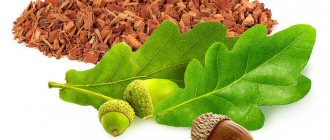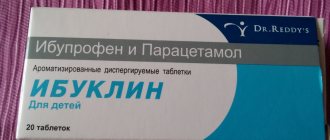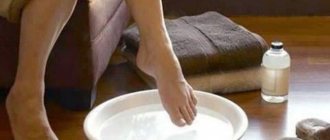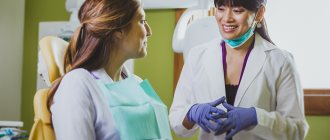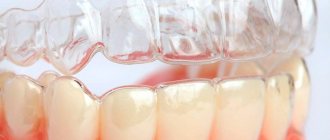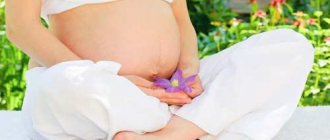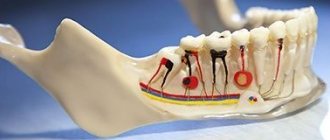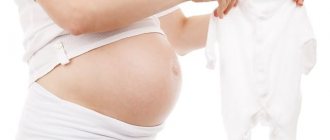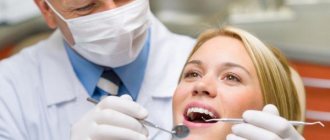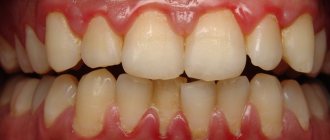Author of the article:
Soldatova Lyudmila Nikolaevna
Candidate of Medical Sciences, Professor of the Department of Clinical Dentistry of the St. Petersburg Medical and Social Institute, Chief Physician of the Alfa-Dent Dental Clinic, St. Petersburg
Pregnancy is both a difficult and wonderful moment in the life of any woman. All the body’s forces are aimed at bearing the fetus, which inevitably leads to hormonal changes. Today we will talk about one of the most pressing problems of women expecting a baby – oral care. What mouthwash should you choose during pregnancy to protect your teeth and gums and not harm your baby? Let's figure it out.
Does pregnancy affect the condition of the gums?
Undoubtedly. One of the main features of the waiting period is the woman’s increased need for vitamins, fluoride, iron, magnesium, as well as phosphorus-calcium complexes. The body becomes more vulnerable and weakened: during pregnancy, many women begin to develop signs of periodontitis for the first time, teeth are rapidly destroyed, and the prevalence of caries increases exponentially.
Problems with teeth and gums during pregnancy indicate a deficiency of nutrients in the mother's body. Often, a woman’s diet at this time lacks calcium, phosphorus, fluorine and other elements, which inevitably leads to the development of caries. To avoid this problem, from the first trimester of pregnancy you should be careful about your diet, add phosphorus-calcium complexes, vitamins (especially A, D, C).
Changed hormonal levels also affect the gums. The most common tissue problems during pregnancy are:
- Inflammation of the gums or gingivitis
. As a rule, a woman experiences swelling of the gums, redness of the tissues, as well as bleeding and pain when brushing her teeth. There is also a high risk of developing hypertrophic gingivitis or gum swelling. In severe forms of the disease, swollen tissue covers more than half of the tooth crown. - Bleeding gums
. The tissues bleed several times a day, and the volume of discharge increases when the gums are exposed to food (chewing) or a toothbrush. - Gum receding
. This very unpleasant phenomenon happens if a pregnant woman uses an overly hard brush and puts excessive pressure on her gums while brushing. Such pockets also appear after advanced gingivitis and periodontitis. - Itching
. The feeling that the gums are constantly itching can be caused by various diseases - for example, ulcerative, catarrhal, hypertrophic gingivitis, periodontitis, stomatitis, candidiasis, allergies, ARVI or influenza. - Pus in the gums.
Separation of pus from the oral cavity is observed with ulcerative gingivitis and periodontitis in the acute stage. With periodontitis, fistulas may also appear on the tissues, as a result of advanced caries or poorly healed canals.
How to reduce the risk of miscarriage with recurrent miscarriage
If a woman has already had a miscarriage, the likelihood of another unsuccessful pregnancy doubles. Therefore, in such cases, it is very important to regularly visit the gynecologist and take all prescribed treatment.
Main causes of miscarriage
The most common cause of miscarriage in the first weeks of pregnancy is genomic and chromosomal abnormalities.
As a rule, these are DNA damage incompatible with the life of the fetus. Women who have had several involuntary abortions in a row often have changes in their immune system. The woman’s body perceives the embryo as a foreign organism and activates defense mechanisms. As a result of such a struggle of immunity, the embryo dies. During a normal pregnancy, the mother’s immunity is somewhat suppressed from the first days, which allows the embryo to implant and develop safely.
Anatomical features of the uterus, hormonal disorders, and genital tract infections can also cause termination of pregnancy at any stage.
Another factor that can cause miscarriage is psychological stress. Under stress, the production of tumor necrosis factor sharply increases, which is involved in a nonspecific immune response and can damage the membranes of the embryo/fetus; also, during stress, placental vasospasm occurs. Therefore, a woman’s emotional state throughout pregnancy is a determining factor for a successful pregnancy.
What to do if there is a risk of losing the pregnancy?
With a high risk of miscarriage (after two or more miscarriages), an important control tool is to analyze the concentration of hCG (human chorionic gonadotropin) in the first trimester and α-fetoprotein in the second trimester.
At the same time, regular ultrasound monitoring is also carried out, in some cases every week. The threat of miscarriage is a reason for hospitalization, but, depending on the circumstances, the choice is often made in favor of home treatment. In any case, you should strictly follow the prescriptions and recommendations of the doctor who is caring for your pregnancy.
If there is increased anxiety or an unfavorable psychological situation in the family or at work, sedatives are prescribed. Glycine is widely used , it is highly effective and, most importantly, safe during pregnancy. The amino acid glycine strengthens the nervous system and improves the emotional state, which eliminates one of the risk factors for miscarriage - psychological stress.
Recurrent miscarriage is also an indication for prescribing progestins from the first day of visiting the antenatal clinic. Progesterone substitutes help maintain sufficient levels of the pregnancy hormone, which promotes normal implantation of the fertilized egg.
Often, if there is a threat of miscarriage, bed rest is prescribed. During the period of implantation of the fertilized egg, nagging pain in the lower abdomen and lower back can be a harbinger of miscarriage. Compliance with bed rest in this case can be a decisive factor in the successful outcome of pregnancy.
To improve fetal nutrition and maturation, metabolic drugs are prescribed. Limontar® improves the growth and development of the embryo from the first days; it is recommended for pregnancy at any stage. The drug activates the processes of energy formation in fetal cells, which increases its viability and exhibits antihypoxic and antioxidant properties. In case of early toxicosis, Limontar® improves the general condition of the mother, which has a positive effect on the condition of the fetus. The drug is completely metabolized in the body and ultimately turns into carbon dioxide and water.
Can rinse aids be used?
According to dentists, during pregnancy it is permissible to use mouth rinses with extracts of medicinal herbs and medications. The components of these drugs act at the local level and do not enter the general bloodstream.
Doctors also advise giving preference to non-alcoholic rinses during pregnancy, since such products do not pose a danger due to the adverse effects of alcohol on the mucous membranes. Non-alcoholic products are ideal as a preventive measure and will help avoid gum problems in the future.
As a rule, for inflammation of the gums, on the recommendation of the dentist, the following types of rinses are used during pregnancy:
- Fluoride-containing
- when the balance of the bacterial flora of the oral cavity is disturbed. - Herbal
– for minor inflammations. - Cetylpyridinium chloride products
are necessary to treat and stop the growth of plaque. These rinses are also used for severe inflammatory reactions. - Rinses with antiseptics
should be used short-term, no longer than 30 days (1 month). Such drugs are prescribed in difficult dental situations, with severe suppuration and abscess formation. - Desensitizing agents are recommended for use in case of increased sensitivity of teeth and gums
Can I use natural remedies?
As an addition to treating gums with a rinse, pregnant women can use herbal decoctions on the recommendation of their doctor. For inflammation, women are advised to pay attention to the following remedies while expecting a baby:
- decoction of oak bark;
- decoction of lingonberry leaves;
- infusion of chamomile;
- decoction or infusion of calendula flowers;
- sage tea.
An excellent helper for a pregnant woman's gums will be Asepta Fresh mouth rinse with chamomile and witch hazel extract. This product is perfect for daily protection of teeth and gums from plaque, and also preserves the natural whiteness of the enamel, soothes the gums and prevents the occurrence of caries. Asepta Fresh mouth rinse does not contain alcohol, dyes or antiseptics and can be recommended without restrictions on the period of use.
Preventing hair loss during pregnancy
Before, during and after pregnancy, you can resort to basic ways to strengthen your hair to help you maintain its strength and attractiveness. Firstly, on the recommendation of a therapist, you should take vitamins; in particular, hair needs microelements such as iron and zinc. A pregnant woman is recommended to consume 40–60 mg of iron and 12–20 mg of zinc per day. Unfortunately, the daily diet of a city dweller is very poor in vitamins and nutrients. To get a daily dose of all the necessary macro- and microelements, we will have to eat 50 kg of food every day!
To maintain the strength and thickness of hair, it is recommended to apply nourishing masks to the scalp 2-3 times a week. The most effective of them can not only be bought in an expensive store, but also made at home yourself. Masks based on egg yolk, cocoa powder, mustard, lemon juice, pepper tincture, honey, rye bread, curdled milk, brewer's yeast prevent hair loss. Rubbing various oils into the hair roots, especially castor, burdock, olive, and also table salt, will be effective. Herbal decoctions have a beneficial effect on the scalp: chamomile, string, burdock, mint, St. John's wort. The use of oak bark tincture has a positive effect.
To stop your hair from falling out too much, you should massage your scalp, either with your fingertips or with an anti-stress tingle. You should not walk around with your hair tightly tied all day; it is better to let it rest loose. You should wash your hair with non-hot water, the optimal temperature is 35–40° C. If possible, you should avoid frequent use of a hair dryer, hair straightener, or curling iron.
Of course, all these hair care methods do not have a significant therapeutic effect and are more good as preventive measures. But during pregnancy, drug treatment and some cosmetic procedures will be contraindicated. And after giving birth, you can begin to “attack” the problem “from all fronts.”
Baldness Treatment Methods
After childbirth, hair will begin to fall out even more actively, because the level of estrogen will drop to normal, and it will no longer be possible to prevent hair loss with masks and massage. In this case, you should contact a specialist who will offer you several options for getting out of the situation:
- taking hormonal medications;
- physiotherapeutic methods: massage with electric charges, cryomassage and others;
- hair transplantation
The last method may seem too scary and painful. However, it is not. In some cases, with very severe hair loss, you actually have to resort to transplantation. There are several methods of hair transplantation, for example, FUE machine or Strip technologies, in which hair is transplanted along with areas of skin. But only one technology is painless - HFE (Hand Follicle Extraction). In this case, the transplant is performed using the patient’s own follicles obtained from other (donor) areas of his body. It is performed with a micro-tool, so there are no scars left, no numbness in the head, and no pain. HFE allows you to restore the natural thickness of hair with a natural angle.
Thus, hair restoration in women after childbirth using seamless technology is most effective. To date, this is the most painless and safest procedure for your health. It is performed by transplantologists-trichologists at the Hair For Ever clinic. Specialists with extensive experience will help you preserve your femininity and beauty!
Clinical researches
Many experts note the high effectiveness of Asepta products. Conducted at the Military Medical Academy named after. CM. Kirov research has shown that products for individual oral hygiene of the Asepta series allow, within 6 months after the completion of complex treatment, not only to improve oral hygiene and reduce inflammatory processes in the gums by 55.37%, but also to reduce number of relapses of localized periodontitis.
To increase the effectiveness of treatment of chronic localized periodontitis of traumatic etiology in young people, it is advisable to include series products in the complex of treatment and preventive measures.
Sources:
- Clinical studies of antisensitive toothpaste “Asepta Sensitive” (A.A. Leontyev, O.V. Kalinina, S.B. Ulitovsky) A.A. LEONTIEV, dentist O.V. KALININA, dentist S.B. ULITOVSKY, Doctor of Medical Sciences, Prof. Department of Therapeutic Dentistry, St. Petersburg State Medical University named after. acad. I.P. Pavlova
- The role of anti-inflammatory rinse in the treatment of periodontal diseases (L.Yu. Orekhova, A.A. Leontyev, S.B. Ulitovsky) L.Yu. OREKHOVA, Doctor of Medical Sciences, Prof., Head of Department; A.A. LEONTIEV, dentist; S.B. ULITOVSKY, Doctor of Medical Sciences, Prof. Department of Therapeutic Dentistry of St. Petersburg State Medical University named after. acad. I. P. Pavlova
- Report on determining/confirming the preventive properties of commercially produced personal oral hygiene products: Asepta toothpaste used in combination with Asepta mouthwash and Asepta gum balm Head. Department of PFS Doctor of Medical Sciences Professor S.B. Ulitovsky St. Petersburg State Medical University named after Academician I.P. Pavlova. Faculty of Dentistry. Department of Preventive Dentistry.
